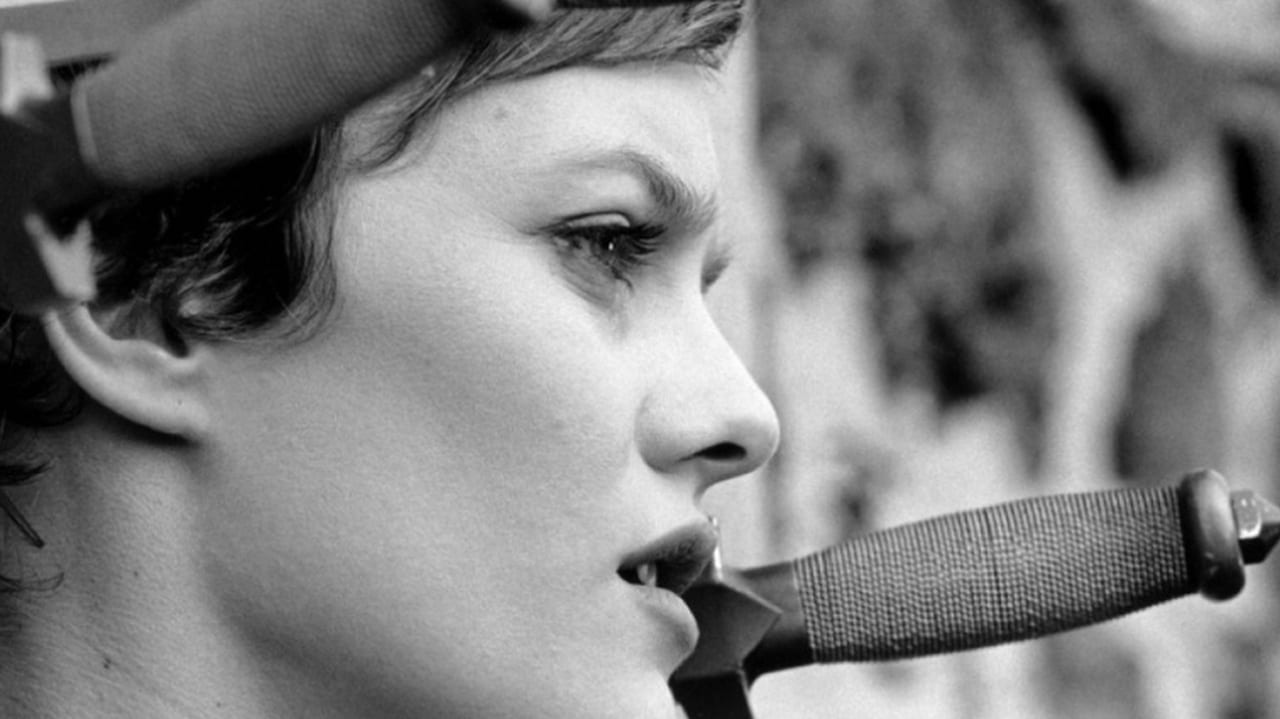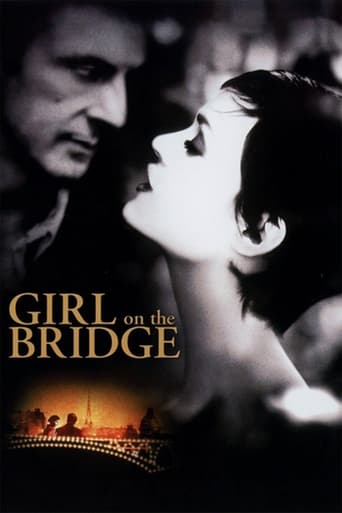



What makes it different from others?
Don't listen to the Hype. It's awful
Great movie. Not sure what people expected but I found it highly entertaining.
View MoreWorth seeing just to witness how winsome it is.
The film opens with an extended shot of a somewhat bedraggled Vanessa Paradis explaining to a woman off screen how her life has been a meaningless mess. The camera watch Paradis carry on for about five minutes, while tears begin to roll down her cheeks. The scene is never referred to again.There is a cut to the same Paradis, still bedraggled, ready to jump off a night-time bridge in Paris. Just as she's about to take a nose dive, she's interrupted by an observer standing nearby, Pierre Auteuil. He doesn't rush to her aid or anything. He tells her that her run of bad luck is just a patch of rough road and, besides, she looks too good to waste. If she's so anxious to off herself, she can come and work for him. He's a knife thrower at a circus. The bridge is where he picks up girls so depressed that they're willing to take the job, regardless of the danger.At this point I began to shudder all over with fear. Not fear for Paradis, but fear that I was in for a long, very French disquisition on the nature and meaning of life, all shot at night and in the rain.But, lo, it's much better than that. In fact, it's pretty good. Briefly, Auteuil and Paradis make a splendid team and they rise to the top of their profession, if that's what it is. The tricks get more difficult. Auteuil throws his knives blind, and then at Paradis while she's rotating rapidly on one of those wheels that the simply dressed target always spins on. They're luck in every respect; they win big at Monte Carlo.Now, your typical-standard American romance has them quit while their career is at its zenith. With their considerable stash, they buy a well-appointed beach bungalow, Auteuil puts himself through medical school and becomes the avuncular brain surgeon he's always wanted to be, and Paradis is ecstatic at finding herself a pregnant housewife with a room dedicated to her home sculpture and macramé.Not here. Paradis is happy enough having knives thrown at her, but she and Auteuil never play doctor together. Instead, he's merely annoyed when her whimsy takes her to somebody else's bed. At one point she's about to make it with a contortionist, an interesting concept.Just when the going is great, she finds "Mister Right" aboard a carnival boat. (I missed the original French for "Mister Right", but that's how the English subtitle came out.) She bids Auteuil a quiet good-bye and she and her new flame depart in a lifeboat. I haven't figured out how they got off the cruise ship in a lifeboat in the middle of the Mediterranean Sea either.But no matter. The plot forges ahead. Mister Right deserts Paradis immediately in Istanbul. She drags herself around the city. It's never explained how she manages to support herself but it's easy enough to guess. Auteuil loses his uncanny skill with the knives and is reduced to selling them for "a few dates or a cucumber." He wind up dressed in tatters and about to jump off a bridge himself.I never took the knives/luck business too seriously, figuring it must be a symbol for something else. By the end, I figured the something else was total commitment in a relationship, including outright expressions of love and including physical intercourse, both of which had been missing. The movie itself prompts this kind of conjecture. Vanessa Paradis hauls him into a dark tunnel, saying that they both know what they want. And what do they want? Another knife-throwing episode, while she writhes orgasmically and Auteuil sweats up a storm, both of them totally glandular.I've always liked Auteuil. He has the face of Humphrey C. Earwicker, a kind of everyman. His nose is as big as his eyes. Paradis' body is flawless. And her face is almost inhumanly handsome except for her teeth. Lots of attractive women have gaps between their two upper incisors, but she has gaps between all of her teeth, so sizable that Auteuil, if he wanted, could throw knives through them.I enjoyed the thing. It was in black and white, and free of those crazy tilted camera angles and wobbling shots and instantaneous editing that more recent films are susceptible to. Try it. You might like it.
View MoreIf you want a provocative romantic double-bill for the weekend, I strongly suggest this film followed by Luc Besson's odd but engaging Angel-A; both films open with an individual about to jump off a bridge in Paris--they are each stopped from leaping by another person who wanders by--leading to complications. Both films are lushly photographed in black and white (odd for such contemporary films, but highly effective), and both give us quirky lead characters who attempt to find some meaning in their lives; The Girl On The Bridge takes us to other cities beside Paris, and Angel-A has a hair-raising shot from the Eiffel Tower--Paris really a major character, too. While adult in nature, neither film is excessively violent,although the language in Angel-A can get pretty salty. Both are often funny in their look at relationships, often satirical, though seldom biting; while not masterpieces, both are good fun for the closet Romantic--and in this case, the director being Patrice Leconte, fun for those of us who like a little weirdness tossed into the narrative.
View MoreThe main character here is played by a young woman who we discover in an extraordinary opening sequence, an interview placed outside of the film proper, where we learn her character and her way of carrying it. This scene is memorable, because of the firmness with which she clings to damage and vulnerability. It is long and intimate, and placed in an audience of which we are a part.The actress playing this girl is perfect. She really is a plain woman, with bad teeth, a sagging chin and misplaced forehead. But when she decides to turn it on, the sun opens up and you receive the sort of beauty film is made for. This actress in fact is a top model; that is her talent, her job and presumably her life.The story surrounds this as a folded wrapper. She finds a man who sees her as his partner, but not as she is used to. He wants to make love of course; we all yearn for this with someone who is a soulmate. They are soulmates, to the extent that they can speak to each other across cities. His love is dangerous and penetrating. It carries the extremes he is capable of and she is of supporting. (The metaphor is knife throwing, but that is as much an abstraction as the water and bridges images — all of which are brilliantly conveyed using pure cinema.)A scene has her begging for him at a train platform, "now, anywhere" and they retire to a shed where he throws at her in the most erotic scene I have seen in years. She is more than radiant, he more than master.The switch here is the switch between good and bad luck, which he introduces. While we are the audience of the two, he is the audience of her; we both throw, we both risk, and we both are rewarded.Ted's Evaluation -- 3 of 3: Worth watching.
View MoreLike many other french movies, this movie is about the beauty of film making, it's about the art that does not necessarily depend on a story. There is a great amount of fantasy in this movie, like most good things in life. One thing that I really liked about the movie was the fact that you can take almost any frame and it could be part of a photography exhibition. Some people may complain about the story, which may be bland by itself; others may complain about the fairytale-type romance in the movie, which may seem too sentimental. But it is the excess of emotions that gives it the flavor of a fairytale. I'd never watch a movie to learn something, because good movies like good poetry is beauty itself, and we don't analyze that.
View More